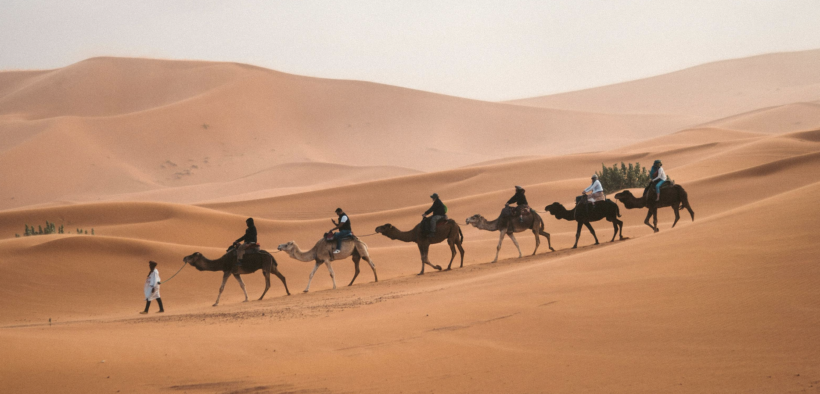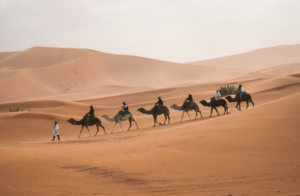On Mission to ‘Finish’ the Great Commission
The Finishing Fund has funded projects to reach over 700 of the world’s hardest-to-reach people with the Gospel.

The Finishing Fund began in 2017, and in its short six-year history, it has been a key player in reaching 705 of the world’s remaining unengaged people groups in 66 countries with the Gospel.

According to its founder Douglas Cobb, the Finishing Fund is a “venture capital fund for the Great Commission.” It vets ministries and funds projects to reach the hardest-to-reach people groups in the world.
Since its inception, it has utilized the Finishing the Task list of unengaged peoples to determine where it would fund projects. As research into the groups grows or changes, the list changes. Cobb expects by the end of the year that projects to reach what he believes to be the remaining 37 unengaged groups will have begun, with the exception of one group.
Unengaged people groups are often small and in the hardest to reach places in the world where “the name of Jesus has never been declared and there has never been even one believer.”
One of the most challenging groups to reach are people on North Sentinel Island in the Bay of Bengal off the coast of India. John Chau was martyred in 2018 trying to reach them, and a new plan has not yet been developed for that group, Cobb said.
The Finishing Fund works primarily with groups that support indigenous missionaries, rather than sending western ones. While Cobb appreciates the value of western missionaries, he sees effectiveness and efficiency advantages in using indigenous leaders.
Native-born missionaries don’t have all of the barriers—climate, disease, food, language—to overcome. They have an entry point through shared language that allows them to be more immediately effective. In addition, westerners can often carry “political freight” with them, especially in Muslim-dominant areas, Cobb said.
Access to MinistryWatch content is free. However, we hope you will support our work with your prayers and financial gifts. To make a donation, click here.
The Finishing Fund can support a team of two missionaries for a three-year project at a cost of between $27,000 and $30,000 total. That is more financially efficient than the cost of training and sending western missionaries.
Cobb sees the division of Great Commission labors as a beautiful picture of the global church. Westerners are particularly good at funding, training, and recordkeeping, thus allowing native leaders to put feet on the ground to share the Good News.
Stories of the Gospel reaching the unreached are numerous, but Cobb relayed one from the early days of the ministry. Missionaries entered a small, remote village in the mountains of a central Asian country. They met a man along the road and told him about Jesus. The man began weeping because he was eager to be rid of the burden of guilt and shame he had carried. His whole family became believers and now there are between 50 and 60 Christians in that village, Cobb said.
At the beginning of its ministry, the Finishing Fund found it easy to connect to groups reaching the list of unengaged groups. It simply vetted and funded those projects.
However, as the number of unengaged groups has been shrinking, Cobb said the Fund has found itself more involved in project development and strategy. He shares the load of the Finishing Fund’s work with Mark Haumschlit, who handles the field-side strategy work.
For the most part, the Finishing Fund doesn’t dictate how the work is accomplished. “We have a saying: ‘We never want the best to be the enemy of the good,’” Cobb said. Sometimes doing something perfectly takes too long, but doing it well can be done much faster, he explained.
What will the Finishing Fund do after this year’s projects to the remaining unengaged groups are started? Cobb said they’ve been thinking about that for a couple years.
He sees the Great Commission as having an ethnic component (every nation or people group) and a geographic component (reaching every place in the world where there are people).
So it plans to move its focus to helping plant churches in every place in the world where there are people.
It has already started funding projects associated with the A.C.H.I.E.V.E. (A church in every village everywhere) alliance and are seeing “amazing results.”
Cobb is humble about the role the Finishing Fund plays in the Great Commission. “We see ourselves as having five loaves and two fish. We bring it willingly, but we are utterly inadequate without the power of God,” he said.
In the MinistryWatch database, the Finishing Fund earns an “A” transparency grade and a 5-star financial efficiency rating. Its donor confidence score is 94, and it is a member of the Evangelical Council for Financial Accountability.
According to Cobb, the Finishing Fund has chosen to be a “major donor” ministry—each partner contributes at least $30,000—to keep its administrative costs very low. “Because our founding partners have agreed to cover our modest administrative expenses out of their investment in the Fund, there are no expense assessments—a dollar to the Fund is a dollar to the field,” Cobb wrote in an email.
Main photo: Photo by Taryn Elliott / Pexel



